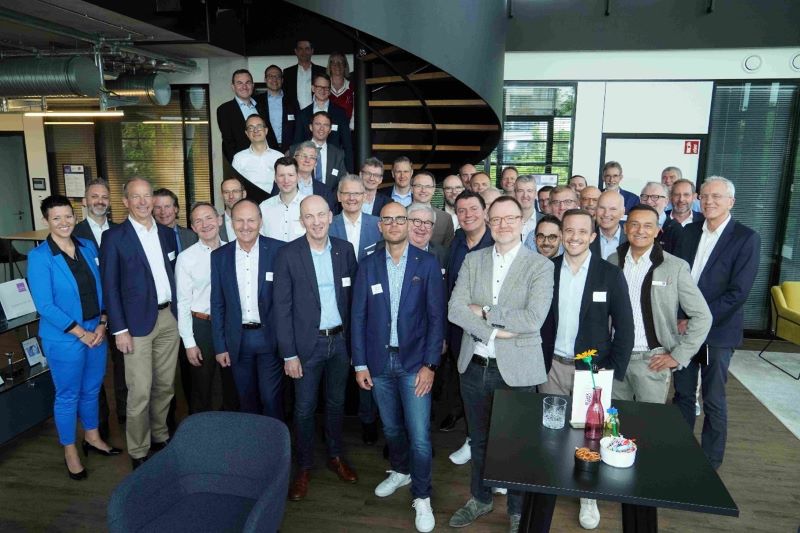AI, Innovation, and IP Strategy: CTO Spring Forum 2025
On May 15, 2025, over 50 technology leaders from the DACH region gathered at the CTO Spring Forum in Munich. This year’s central topic was the transformative power of artificial intelligence (AI) in the innovation and patent process. As AI reshapes industries, understanding its impact on IP is critical for staying competitive.
AI in the Innovation and Patent Process
AI is transforming every stage of the innovation process, from initial idea generation to final product development and patent protection. In the early phases, AI can support creative ideation and trend analysis by scanning vast amounts of data to identify emerging market needs and technological gaps. It can also enhance R&D by optimizing experiment designs, simulating complex systems, and accelerating material discovery. This capability significantly reduces time-to-market and lowers R&D costs, allowing companies to innovate faster and more efficiently.
During prototyping and design, AI tools can automate generative design processes, enabling engineers to explore thousands of design variations based on specific performance criteria. This results in more innovative, cost-effective designs with improved performance. In manufacturing, AI-driven robotics and predictive maintenance systems improve production efficiency, reduce downtime, and ensure consistent quality.
From a business perspective, AI also plays a critical role in market analysis, customer segmentation, and personalized marketing strategies. AI-powered systems can analyse vast amounts of customer data to optimize pricing, predict customer behaviour, and enhance user experiences, directly impacting the bottom line.
In the patent process, AI can be a game-changer. It can support patent strategists by identifying “white spots” – areas where few or no patents exist – helping companies capture untapped market opportunities. AI-driven tools can automate prior art searches, assess patent claim strength, and even draft patent applications, significantly reducing legal costs and turnaround times. Moreover, AI can assist in evaluating the competitive landscape, predicting technology trends, and managing patent portfolios, providing a strategic advantage in fast-moving industries.
As intellectual property becomes increasingly critical to business success, integrating AI into IP management can reduce risks, uncover new innovation pathways, and strengthen long-term competitive positions. For companies looking to lead in the AI age, a forward-looking patent strategy that leverages AI tools is no longer optional – it’s essential.
Meet the IP Subject Matter Experts
We also introduced the Subject Matter Experts from the IP Business Academy, who shared their insights on critical aspects of IP management:
🔹 Bas Albers – Bas specializes in IP strategy for SMEs, helping smaller businesses build competitive patent portfolios despite limited resources. He focuses on creating practical, scalable IP strategies that align with business goals.
🔹 Daniel Holzner – Daniel is an expert in IP white spot analysis, identifying untapped innovation opportunities using AI tools like patentbutler.ai. He helps companies map the competitive landscape to uncover technology gaps and build strong IP positions.
🔹 Alihan Kaya – Alihan advocates for sustainable innovation, ensuring that IP strategies are aligned with long-term environmental goals. His approach integrates sustainability into every stage of the innovation process, from ideation to commercialization.
🔹 Donal O’Connell – Donal is a recognized expert in trade secrets, emphasizing the critical role of confidential business information in competitive advantage. He advises companies on securing and managing trade secrets in a digital world.
🔹 Robert Klinski – Robert focuses on invention harvesting, helping organizations capture innovative ideas early in the R&D process. He works closely with engineering teams to identify and protect valuable technical insights.
🔹 Ilanit Appelfeld – Ilanit guides startups through the complexities of IP, providing strategies for rapid growth and effective market entry. She focuses on building resilient IP portfolios that can withstand competitive pressure.
🔹 Martin Bookjans – Martin specializes in IP department organization, streamlining processes to boost efficiency and reduce costs. His work helps companies align IP management with their broader business strategies.
🔹 Oliver Baldus – Oliver is an advocate of lean IP, focusing on cost-effective, agile approaches to IP management. He supports companies in building efficient IP operations without sacrificing quality or coverage.
🔹 Stefan Brehm – Stefan’s expertise lies in patent search and analysis, using AI to refine search processes and enhance IP strategies. He helps clients reduce risk by providing accurate and comprehensive patent insights.
🔹 Michael Felbinger – Martin combines human intelligence (HI) and AI to create powerful patent search strategies. His approach merges the intuition of human experts with the speed of AI-driven data processing.
🔹 Til Bußmann-Welsch – Til specializes in lawyer opinion observation, ensuring that IP strategies are legally sound and defensible. He provides expert guidance on patent enforcement and litigation readiness.
🔹 Simon Lud – Simon focuses on creating litigation-grade patents, ensuring that IP assets stand up in court. He advises clients on building robust patent portfolios that can withstand legal scrutiny.
Looking Ahead
The forum highlighted the critical need to integrate AI into every stage of the innovation process – from idea to IP strategy. As AI continues to shape the future of business, it is no longer a niche technology but a strategic priority. Companies that embrace this shift will gain a significant competitive edge, with faster time-to-market, reduced R&D costs, and stronger patent portfolios. The time to act is now, and those who seize this opportunity will be the innovation leaders of tomorrow.



